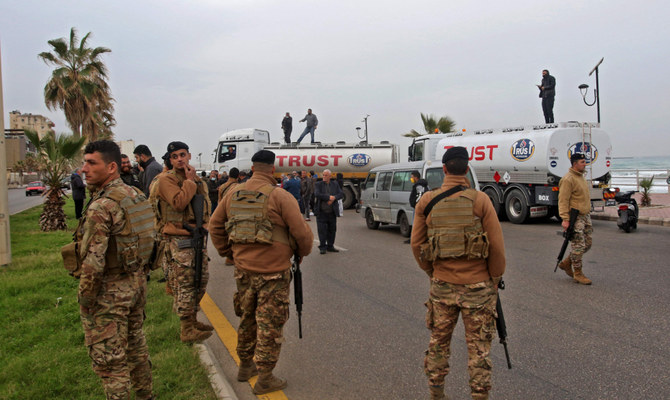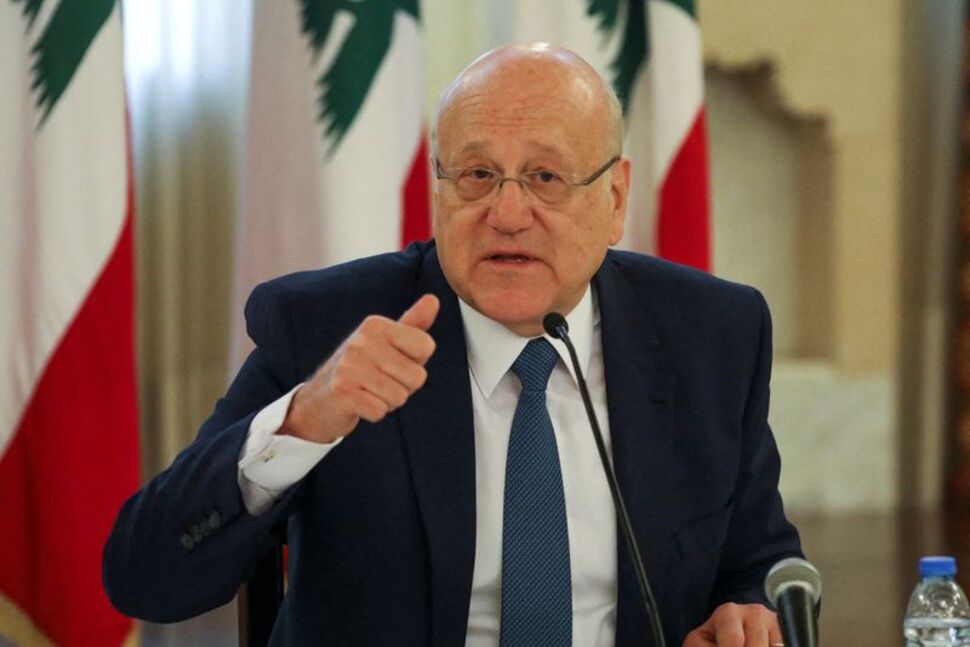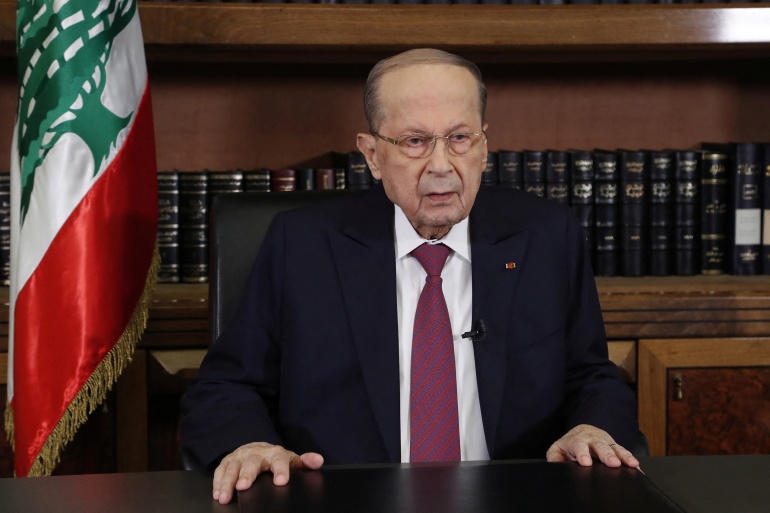
By Najia Houssari -- arabnews.com -- BEIRUT: Lebanon’s public transport drivers blocked roads on Thursday, paralyzing traffic throughout the country in protest against the manipulation of exchange rates that has left them out of pocket. A driver in downtown Beirut said: “We can barely afford hospitalization or medicine. We are begging healthcare associations for our rights that the state is supposed to secure for us.” Banks did not open on Thursday, as employees were unable to get to work, while schools and universities were also closed. In less than a year since the removal of subsidies, the price of a 20-liter canister of gasoline has increased tenfold to almost 400,000 Lebanese pounds ($264), while the minimum monthly wage of 675,000 pounds has remained unchanged.
Fadi Abou Shakra, a representative of Lebanon’s fuel distributors who took part in the protests, said: “Our issue with the state is the rise in the exchange rate. Officials did nothing to control the illegal platforms manipulating the exchange rate. It is not our hobby to block roads and create problems. Today is a day of anger and we’ll see what next week brings.” Soldiers and other security forces were deployed to control the situation after disputes broke out between protesters and members of the public trying to use the blocked roads. The protesters were supported by the head of the General Labor Union, Bechara Al-Asmar, who said the action was “a cry for officials to perform their role and duties toward the people.”

المؤمِنون بــــ"لبنانَ الكبير"، وهُم من جميعِ الطوائفِ والمناطق، ظنّوا أنّهم أنْجزوا مَهمَّتَهم مع إعلانِ إنشاءِ الدولةِ وانتزاعِ الاستقلالِ وإقرارِ "اتفاقِ الطائف". وتَوقّعوا أن تكونَ المحنُ والحروبُ التي مَرّت على اللبنانيّين كافيةً ليَستخْلِصوا العِبرَ ويَقتنِعوا بكيانِ لبنانَ وخصوصيّتِه وحِيادِه وهُويّتِه. لكنَّ الـمُلحِدين بلبنان، المؤمنين بِــمشاريعَ دينيّةٍ وقوميّةٍ وانفصاليّة، وهُم من جميعِ الطوائفِ والمناطق أيضًا، شَرَعوا بتدميرِه منذ لحظةِ تأسيسِه، ولم تَنفَع لثَنيْهِم كلُّ التنازلاتِ والتسوياتِ السياسيّةِ والتعديلاتِ الدستوريّة. يُعطّلون الوِحدةَ المركزيّةَ المرتكِزةَ على دستورَي 1943 و"الطائف"، ويَرفُضون اللامركزيّةَ الضيّقةَ والموسّعةَ والفدراليّةَ. هذا النَزقُ الدُستوريُّ المتَعمَّدُ أوْدى بهم إلى اعتبارِ اللامركزيّةِ كما الفدراليّةِ تقسيمًا، بُغيةَ منعِ تطويرِ صيغةِ "لبنانَ الكبير" ورَفْدِها بعمرٍ جديد، ورغبةِ السيطرةِ على كاملِ لبنان والعيشِ على حسابِ الآخرين. هؤلاء، يُحوّلون الاعترافَ بلبنانَ وطنًا نهائيًّا إلى نهايةِ لبنانَ الوطن.
هذا المنْحى الإلغائيُّ، السائدُ في السنواتِ الأخيرة، يلتقي مع ضعفِ العناصرِ التي تُكوِّنُ وِحدةَ الأمّةِ اللبنانيّة. حين تَنشأُ الدولةُ/الأمّةُ تَستعيدُ تاريخَها وتُحدِّقُ إلى المستقبل، بيدَ أن اللبنانيّين استعادوا تواريخَ متنافِرةً وحَدّقوا إلى مُسْتقبَلاتٍ مُضادّةٍ. فلا تاريخُ الأمّةِ جَمعَهم ولا قوانينُ الدولةِ وَحَّدَتهم. وها لبنانُ اليومَ يَشهَدُ تهاوي أسُسِ نشوئِه من خلالِ ما يلي: 1) تبادلُ انتهاكِ السيادةِ والاستقلالِ بين دولٍ أجنبيّةٍ وقِوى محليّة. 2) فَلتانُ الحدودِ الدُوليّةِ لتطبيعِ اللبنانيّين مع فكرةِ تعديلِ الكيان. 3) تغييرُ التوازنِ الديمغرافيِّ بالحروبِ والتهجيرِ والهِجرةِ والتجنيسِ والدمجِ والتوطين. 4) التباينُ بين المكوِّناتِ اللبنانيّةِ حولَ التاريخِ المشترَك وتَعذّرُ الاتّفاقِ على كتابِ تاريخ. لا توجدُ أمّةٌ ليس لديها كتابُ تاريخ. 5) انفضاضُ عقدِ التماسكِ الاجتماعيِّ والتباعدُ بين أنماطِ الحياةِ والثقافات. 6) انفصامُ الشعورِ بالانتماءِ إلى وِجدانٍ وطنيٍّ واحدٍ وقضيّةٍ واحدةٍ ومستقبلٍ واحد. 7) تَفَشّي الولاءاتِ الخارجيّةِ المناقِضةِ مصلحةَ لبنان والمتناقِضةِ في ما بينها. 8) تحوّلُ الأديانِ من مجموعةِ قيمٍ روحيّةٍ تُرتِّلُ لحنَ التعددّيةِ إلى مذاهبَ انحرَفَت عن مَدارِها الدينيِّ وعاثَت بالأمّةِ تَفرِقةً. 9) انهيارُ الدولةِ اللبنانيّةِ الجامعةِ التي هي الإطارُ الدستوريُّ والقانونيُّ والمؤسّساتيُّ للأمّةِ والوطنِ والكيان. فالأمّةُ اللبنانيّةُ، بعَصَبِها وحضارتِها وجَبلِها ومدائنِها وشعبِها الأصيل، سَبقَت نشوءَ الدولةِ اللبنانيّةِ وحَضّرت لها.

by reuters -- Lebanon's prime minister said on Wednesday the government had not interfered with the judiciary's work, after reports that he had put pressure on a judge who is seeking data from banks in an investigation into the conduct of the central bank governor. Prime Minister Najib Mikati said last month that veteran Governor Riad Salameh, who is at the center of domestic and international probes over allegations ranging from fraud to embezzlement, should stay in his job to avoid adding to problems in Lebanon as it navigates a deep financial crisis. "It is also necessary to clarify what came out yesterday (Tuesday) about matters related to the judiciary. In this context, I say it is not true that we interfered in the work of the judiciary or in any decision taken by the judiciary," Mikati told a news conference. Al Akhbar and other Lebanese news outlets said Mikati had called Lebanon's top prosecutor, Ghassan Oueidat, and threatened to resign if Judge Jean Tannous continued to press banks for data in his investigation. The Tannous probe is investigating allegations of embezzlement and other misconduct at the central bank involving about $300 million in gains made by a company owned by Salameh's brother, Raja.
Oueidat did not respond to a request for comment. Reuters has been unable to reach Raja Salameh and the central bank said it did not have his contact details. Riad Salameh, who has run the bank for almost three decades, has repeatedly denied the accusations of wrongdoing being investigated by Tannous or by other Lebanese and international probes. Two sources told Reuters that members of Lebanon's state security had visited at least two commercial banks on Tuesday as part of the Tannous investigation, seeking information on the governor's brother. One of the sources with knowledge of one visit said the security officials initially pressed bank officials hard for data but then suddenly changed tack, softening their demands. "The security forces got friendlier and started asking general questions rather than specifics... and that's it, and they left," the source said, asking not to be named because of the sensitivity of the issue.

By Dale Gavlak -- voanews.com -- Political opponents of Lebanese President Michel Aoun are resisting his call for a national dialogue conference on the worsening economic crisis and other issues, sensing he may try to use it for his and Hezbollah's political gain. Meanwhile, the nation’s currency has plummeted further, by more than 15% of its value since the start of the year, leading to more misery for ordinary Lebanese. Michel Aoun, Lebanon’s Christian president who provides political cover for the Iran-backed Shiite Hezbollah militia and political powerbroker, says a national defense strategy could be part of the talks. Lebanon observer Michael Young said calling for a national “defense strategy has particular resonance for Hezbollah.” Writing in Dubai’s The National newspaper, Young said this is “another term for finding a formula to integrate the party’s weapons arsenal into the state.”
Many Lebanese have long called for Hezbollah, which is the only militia to have kept its arms from Lebanon’s 1975 to 1990 civil war, to decommission its weapons. But Aoun’s opponents suspect he may be hedging for talks as a means to corner Hezbollah into bolstering his son-in-law Gebran Bassil’s chances to succeed him in the presidency when his term ends later this year. So far, former Sunni Muslim prime minister Rafik Hariri, Druze leader Walid Jumblatt, and Aoun’s Christian rival Samir Geagea have rejected his invitation for talks. Habib Malik of the Lebanese American University told VOA he sees Aoun and Bassil jockeying for influence ahead of elections for parliament in May and those for the presidency later in the year. “It is political theater. Much of it is contrived and calculated with very clear aims in mind. Bassil is sinking fast in terms of any popularity among the Christians and for him to even remotely hope to succeed in the upcoming May elections, let alone be Hezbollah’s candidate for the presidency next November, he’s going to really have to put on a Houdini-like contortion. What we are seeing right now is a calculated move to try and polish his image before any remaining gullible Christians,” he said.
Khazen History


Historical Feature:
Churches and Monasteries of the Khazen family

St. Anthony of Padua Church in Ballouneh
Mar Abda Church in Bakaatit Kanaan
Saint Michael Church in Bkaatouta
Saint Therese Church in Qolayaat
Saint Simeon Stylites (مار سمعان العامودي) Church In Ajaltoun
Virgin Mary Church (سيدة المعونات) in Sheilé
Assumption of Mary Church in Ballouneh
1 - The sword of the Maronite Prince
2 - LES KHAZEN CONSULS DE FRANCE
3 - LES MARONITES & LES KHAZEN
4 - LES MAAN & LES KHAZEN
5 - ORIGINE DE LA FAMILLE
Population Movements to Keserwan - The Khazens and The Maans
ما جاء عن الثورة في المقاطعة الكسروانية
ثورة أهالي كسروان على المشايخ الخوازنة وأسبابها
Origins of the "Prince of Maronite" Title
Growing diversity: the Khazin sheiks and the clergy in the first decades of the 18th century
Historical Members:
Barbar Beik El Khazen [English]
Patriach Toubia Kaiss El Khazen(Biography & Life Part1 Part2) (Arabic)
Patriach Youssef Dargham El Khazen (Cont'd)
Cheikh Bishara Jafal El Khazen
Patriarch Youssef Raji El Khazen
The Martyrs Cheikh Philippe & Cheikh Farid El Khazen
Cheikh Nawfal El Khazen (Consul De France)
Cheikh Hossun El Khazen (Consul De France)
Cheikh Abou-Nawfal El Khazen (Consul De France)
Cheikh Francis Abee Nader & his son Yousef
Cheikh Abou-Kanso El Khazen (Consul De France)
Cheikh Abou Nader El Khazen
Cheikh Chafic El Khazen
Cheikh Keserwan El Khazen
Cheikh Serhal El Khazen [English]
Cheikh Rafiq El Khazen [English]
Cheikh Hanna El Khazen
Cheikha Arzi El Khazen
Marie El Khazen